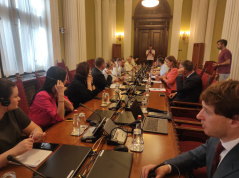National Assembly of the Republic of Serbia / Activities / Activity details

28 September 2023 The participants of the meeting
Thursday, 28 September 2023
Dubravka Filipovski Shares European Integration Process Experience and Good Practice Examples with Moldovan Delegation
European Integration Committee Deputy Chairperson Dubravka Filipovski met today, at the National Assembly House, with a delegation from Moldova, headed by Natalia Suceveanu, head of the Centre for Legal Harmonisation.
Dubravka Filipovski briefed the delegation on the experiences of the Republic of Serbia in the European integration process, stressing that the path of each country in this process is complex, but in the case of our country it carries special weight, because of the dialogue between Belgrade and Pristina. She said that the European integration process is one of Serbia’s chief foreign policy priorities, but it has to go both ways, and Moldova should bear in mind that Serbia's experience has shown that enlargement policy is not high on the EU agenda.
Filipovski spoke in great detail about the obligations of the National Assembly, its European Integration Committee and Stabilisation and Association Committee in the European integration process. She emphasised that citizens' trust in the EU, according to surveys, is declining, but there is hope in the fact that two-thirds of the citizens support the reform process in our country, the results of which are already visible due to the harmonisation of our legislation with the European.
"Serbia has been in the EU accession process for 20 years, that is a very long period for a country to be standing at the door of the European Union, and it is understandable that the citizens are losing confidence in that process," said Dubravka Filipovski. She informed the delegation about the change in the methodology of the accession process, as well as the fact that Serbia has not had an Intergovernmental Conference for two years at which the opening of the third out of six clusters would have been approved.
The Moldovan delegation was interested in the technical details of the committee organisation, the role of the Parliament and the need to change its Rules of Procedure in order to increase the MPs’ control function in the European integration process. They expressed great interest in legal expertise and Serbia’s good practice examples and received clear guidelines for the prospective start of the process in Moldova.




